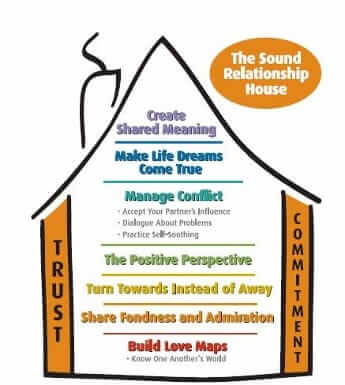Couples Therapy
Specialty
Couple Therapy
I grew up in Taiwan, a culture where an individual’s identity is attached to the family relationship system. I start to develop an interest in working with couples while pursuing my master’s degree in counseling.
I later affirmed the decision to pursue the study in couple and family therapy while working with adult survivors of childhood sexual abuse in Taiwan. I observed the trauma survivors’ recovery is correlated to the support system. Therefore, when I had a chance to pursue my doctoral degree, I sought to advance my Couple and Family therapy training.
Couple therapy is an investment of emotions and time for couples. Here, I provide a brief overview of my approaches to couple’s therapy.
“Love isn’t a state of perfect caring. It is an active noun, like struggle. To love someone is to strive to accept that person exactly the way he or she is, right here and now.”
~ Fred Rogers
Gottman's Framework
Drs. John and Julie Gottman’s “Sound Relationship House” Model serves as my framework when working with couples. Based on this model, I assess whether the partners understand each other and maintain awareness of each other (Build Love Maps), whether they can see each other’s positive attributes (Share Fondness and Admiration), whether they can see each other as the significant secure base to have fund and to seek comfort (Turn Towards Instead of Away).
I assess the couple’s interaction and their view about each other, and these three levels provide me their baseline when they are not in conflict.

When working with partners from different cultural/ethnic backgrounds, these two levels help partners understand the importance of creating shared meaning in their couple relationship, which is their unique culture, not just the American culture or the Chinese culture, for example.
Most couples come into therapy because of communication issues. However, specifically, they go into treatment because of the conflict (unable to communicate or to understand each other). The following two levels in the Sound Relationship House helps me to assess whether they can give each other the benefit of the doubt (“He/She is acting differently today and I wonder why”) when differences arise (The Positive Perspective). When the conflicts have persisted, how the couples have managed to resolve or repair the conflicts (Manage Conflicts).
The four walls in the “Sound Relationship House” are “trust” and “commitment.” When working with couples for infidelity recovery, these are the two areas that need to be discussed and redefined.
The top two levels of the Sound Relationship House are beneficial in exploring how the partners have been managing their repetitive conflicts.
Often, the couples cannot work through disputes and lock into the gridlock because of the disappointment of the dreams as a couple or unable to find shared meaning.
When working with partners from different cultural/ethnic backgrounds, these two levels help partners understand the importance of creating shared meaning in their couple relationship, which is their unique culture, not just the American culture or the Chinese culture, for example.
My Process
Before the first meeting, each partner will fill out intake forms and assess their moods, such as depression and anxiety. I ask each partner to fill out the form individually to have an idea of their take on the relationship while they can feel free to tell me what they want to say without their significant others next to them.
I follow the Gottman Methods by understanding the relationship history, from the time you first met each other to where you are now. When you go to see a doctor, the doctor often asks about your health history. As a couple’s therapist, the couple’s relationship itself has a history. I invited the partners to share with me from the time their first impression of each other, their transition and decision to become a couple, significant events (such as buying a house, career change, or loss of the parent) in the couple history, unresolved conflicts and the reasons for therapy.
I also scheduled individual appointments with each partner after the couple’s history sessions. A person is more than just a partner.
In the personal session, I get to know each partner, his/her likes, interests, work, extended family, childhood experiences, and mental health issues. The last step of the assessment is to establish the treatment goals together.
I present to the couples what I see based on their interaction. They confirm, correct, or add to my observation.
Then, we come up with the treatment goals together.
The initial assessment can range from 3-6 sessions. The treatment goals are two folded, the growth and healing of the individual partner and the couple as a unit.
“Marriage is not a love affair. A love affair is a totally different thing. A marriage is a commitment to that which you are. That person is literally your other half. And you and the other are one. A love affair isn’t that. That is a relationship for pleasure, and when it gets to be unpleasurable, it’s off. But a marriage is a life commitment, and a life commitment means the prime concern of your life. If marriage is not the prime concern, you’re not married…”
~ Joseph Campbell
Treatment Modality
Gottman Methods is my framework to assess the couple relationship, but my primary treatment methods are Eye Movement Desensitization and Reprocessing (EMDR) and Accelerated Experiential Dynamic Psychotherapy (AEDP).
I strive to help the couples to establish a secure attachment with each other. Many people seek to rectify their childhood insecure attachment style in the intimate relationship but feel disappointed in the intimate relationship. Adult Attachment is a bi-directional process where both partners seek proximity to each other, attune with each other’s emotions and needs, and provide comfort and protection when the other person is in distress.
For an individual with a childhood family trauma history, establishing a secure attachment relationship with the current partner requires healing the trauma, communicating needs and trust, and exchange emotions and vulnerability. EMDR and AEDP theories and strategies provide me skills to assist the couples to recover from the trauma and transform the relationship from insecure attachment to secure attachment for their future together.
Couple's therapy requires a very delicate balance of my collaboration with each partner to benefit the relationship. I often described that "relationship" is our primary clients and the three of us work together for the better good of the relationship. To balance my relationship with each partner, I do NOT mix and match couple and individual therapy.
That is, I do not see a client for individual therapy and change it into couple therapy. It makes the partner who joins later as "the third person" in my relationship with the first partner. I also do not see a couple for therapy and change it to individual therapy with one of the partners. I can see partners individually during the couple therapy process, but all information will be shared in the couple therapy sessions.
As "trust" and "commitment" are the four walls in the couple relationship, there are two implications in our work together. I will not keep the secret from one partner to the other. If you tell me something individually, I will encourage you to share them with your partner on your own in our next session. If you are currently in the infidelity situation and haven't cut off or can't decide whether you can cut off that relationship or not, I am unable to work with you. If you plan to use the insurance, please note that the insurance company reimburses "medical issues" as it is "medical insurance." Therefore, the insurance company only reimburses the clients with mental health issues fulfilled a psychiatric diagnosis.
For couples who seek couple therapy, "we don't get along" or "we fights" is not a medical issue. "We don't get along, and that made me depressed," and your depressive symptoms fulfilled the medical diagnosis that is the medical issue.
There are two implications of the medical necessity to the couple's therapy. First, one of the partners needs to have a mental health diagnosis. Try to think about this as going to your doctor's appointment. Your doctors will assess what brings you to the visit and give you a diagnosis for your insurance company. Like physical health, I assess the clients' mental health conditions based on their self-report assessment before the intake and based on my observation and communication in the sessions. I make the diagnosis based on these two sources and assess how the mental health issues play out in the couple's relationship/interaction.
The second implication is that at least one of the partners will carry a mental health diagnosis.
Currently, I do NOT practice the medical model of couple's therapy. I work with couples with their relationship issues. For couples with one or both partners with mental health issues, I prefer to work with the partner with mental health issues INDIVIDUALLY.
(“No Surprise” Act)
In January 2022, Congress passed the “No Surprises” Act that obliges health care providers—including mental health providers—to furnish clients who self-pay with a “good faith estimate” of the cost they might expect to incur in the calendar year. (Link to “no surprise act” is here)
Under the law, health care providers need to give patients who don’t have insurance or who are not using insurance an estimate of the bill for medical items and services.
Your own cost will be number of visits you schedule multiplied by my fee. Currently, my standard fee is $180/hr for the initial assessment and $160/hr for the ongoing sessions. An hour session is generally 50-60 minutes. Some clients might request longer session, such as for the couple’s therapy or EMDR therapy. How many visits you can expect is variable, difficult to anticipate, and ultimately, up to you. I will provide existing clients with a good faith estimate based on a range of number of sessions in the calendar year.
Contact Dr. Chen
Get In Touch
Are you ready to take action? The easiest way to contact me is to fill out the following information and send it to me.
Address
12 Essex St. STE 8, Andover, MA
Phone
978-482-7480
